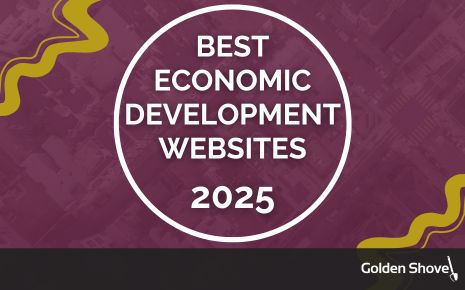How to Build Economic Development Strategies That Deliver Results

5 Jan 2025
News, Marketing, Strategic Plan
Comprehensive economic development strategies provide a framework for organizations and communities to meet essential growth goals. Data and local knowledge shape the best strategic plans for economic development organizations and help coordinate initiatives focused on company acquisition, workforce development, entrepreneurship, and employer retention. Golden Shovel Agency has the experience, marketing services, and critical partnerships to allow communities to become part of the conversation to achieve those goals.
Components of comprehensive economic development strategies
According to the U.S. Department of Commerce, a SWOT analysis, a strategic direction and action plan, and an evaluation framework will form the comprehensive economic development strategy, or CEDS. A well-planned CEDS guides EDOs and other regional entities, such as local governments, school systems, and community organizations, invested in economic expansion. It also informs additional strategic planning. To develop economic development strategies that deliver results, consider the following tips.
Make an honest assessment of the community
Before setting strategies for the future, it’s important to analyze where a community is at as the work begins. Being extremely honest about strengths, weaknesses, opportunities, and threats with a SWOT analysis sets the stage for setting effective and realistic goals. For example, an EDO with a long-term goal of recruiting talent can refer back to a CEDS for quality-of-life points to be addressed before launching significant recruitment efforts.
Utilize the expertise of stakeholders
Another essential component of successful economic development strategies is buy-in with the community, including other local entities and organizations. When establishing a strategy, solicit input from key stakeholders, such as city and county government officials, business leaders, educational leaders, and the public. Creating a sense of shared ownership often leads to more effective collaborations on essential objectives.
Be specific and realistic about goals when finalizing economic development strategies
Achievable, demonstrable results come from proper goal setting. Having a big vision is OK, but goals need to be SMART - Specific, Measurable, Attainable, Relevant, and Time-bound - which means breaking a vision or massive goal down into smaller goals.
For that EDO tackling quality-of-life initiatives, SMART goals could involve establishing specific projects as goals: establishing three walking trails in local parks in 12 months, drafting an incentive program for housing developers and presenting it to the city council in 3 months, or launching a new website to highlight the benefits of living in your city in 6 months. Each smaller goal serves the larger goal of talent recruitment while establishing a track record of success.
Build on existing assets
The SWOT analysis undertaken for a CEDS identifies existing assets in your community. Find your strengths and share them to achieve greater success. If your community has a cluster of highly skilled tradespeople, targeting manufacturing or adjacent industries should yield better results than pursuing tech companies. Is there a growing sense of outdoor adventure in your community? Consider tourism and retail recruitment to support hikers, bikers, kayakers, and hunters. Using your strong points as a starting point for growth can generate the track record and revenue required to take strategic planning to the next level.
Amplify your investment tool kit
Recruiting businesses and workers to a community often requires infrastructure improvements or service enhancements. Funding to support growth is limited for many EDOs and cities, but other ways exist to incentivize development. Tax-increment financing can help fund development in some areas, while tax abatement programs offer businesses financial assistance without tapping into existing city funds. Simple process changes, such as streamlining a permit process or expediting zoning and permit approvals, demonstrate a business-friendly atmosphere and can set a city apart when competing against similar communities for relocations or talent acquisition.
When crafting economic development strategies, examine your community, generate buy-in, and play to your regional strengths. For outside input or assistance with the strategic planning process, email Golden Shovel Agency.
More Topics





